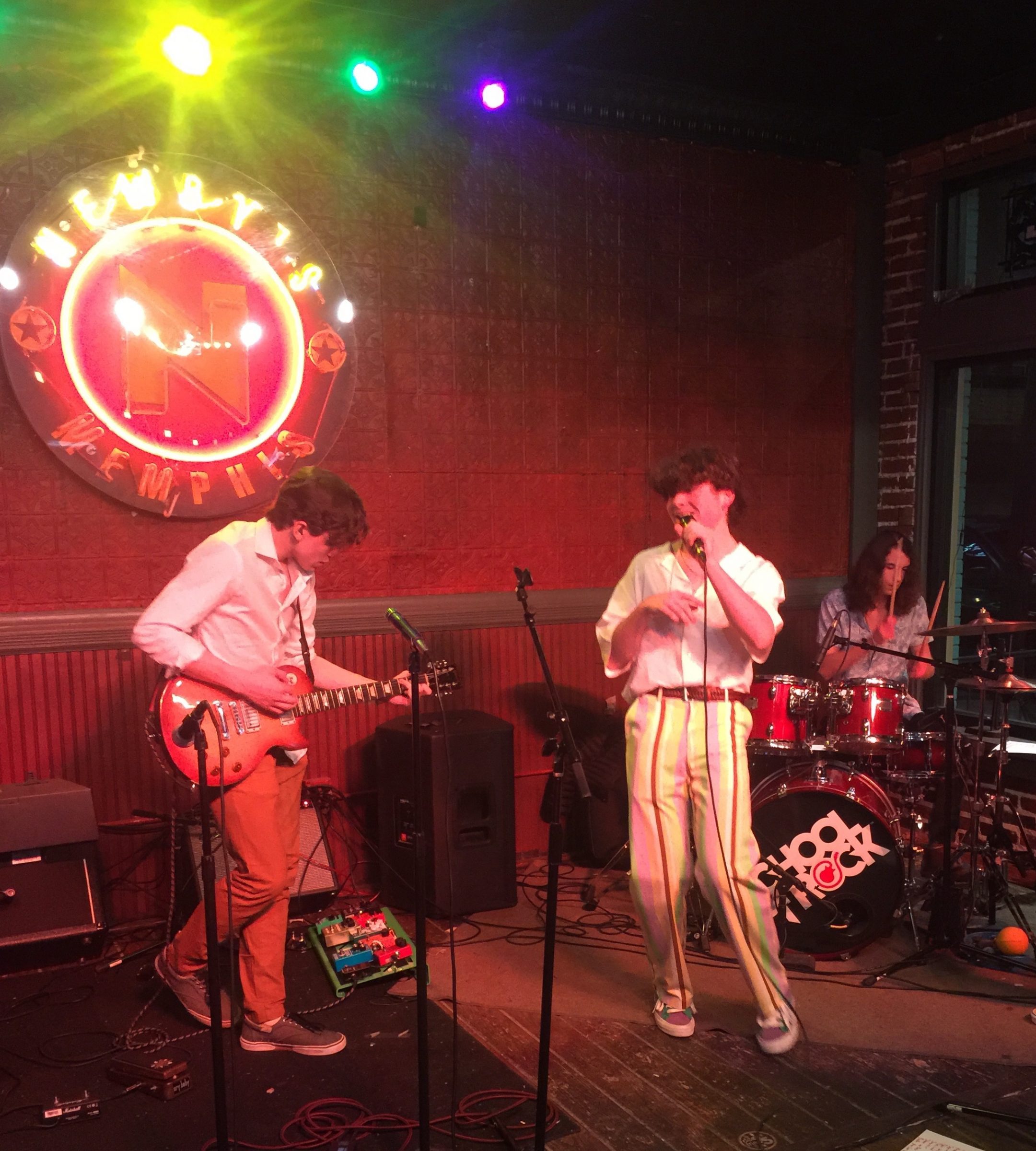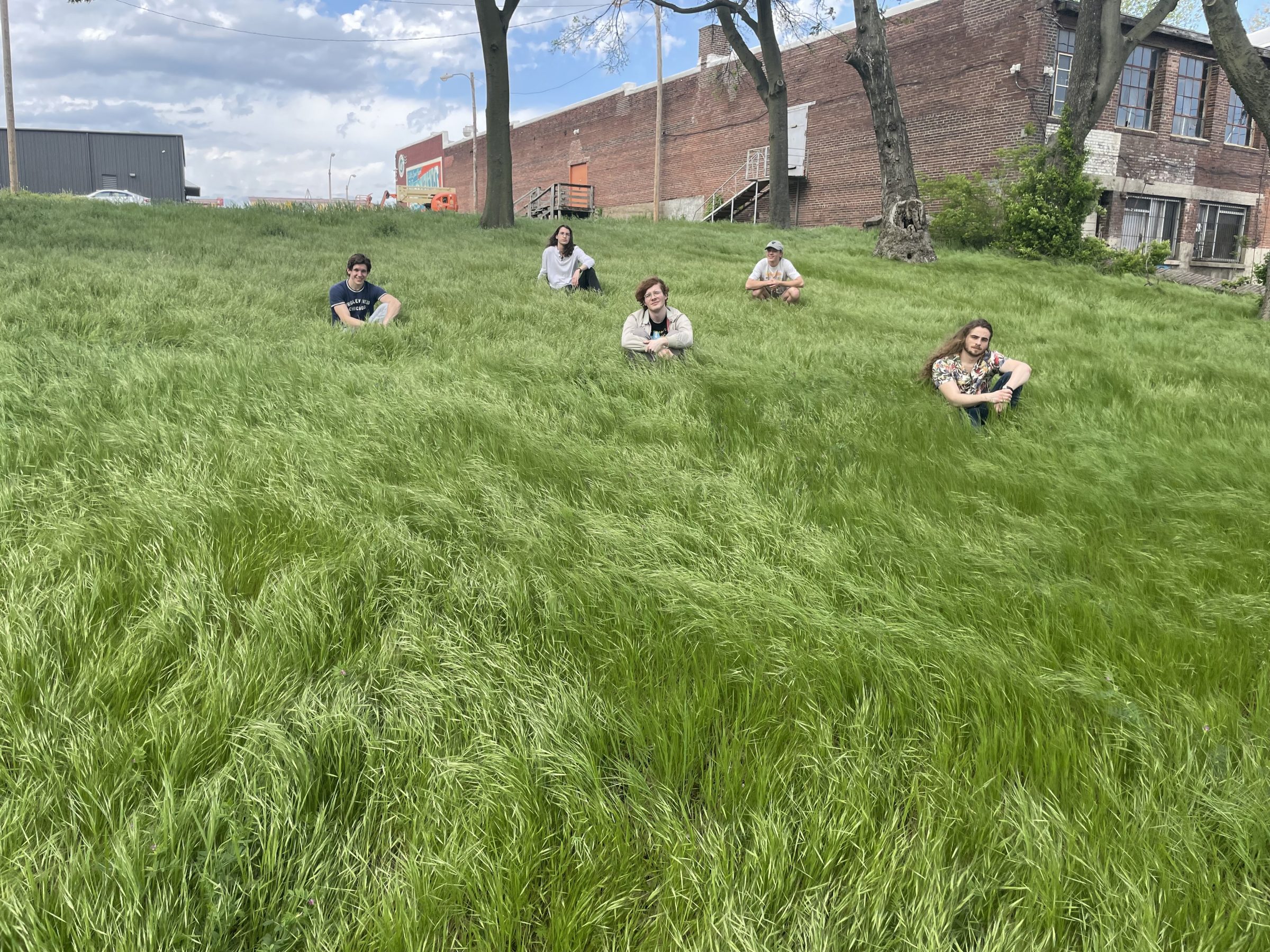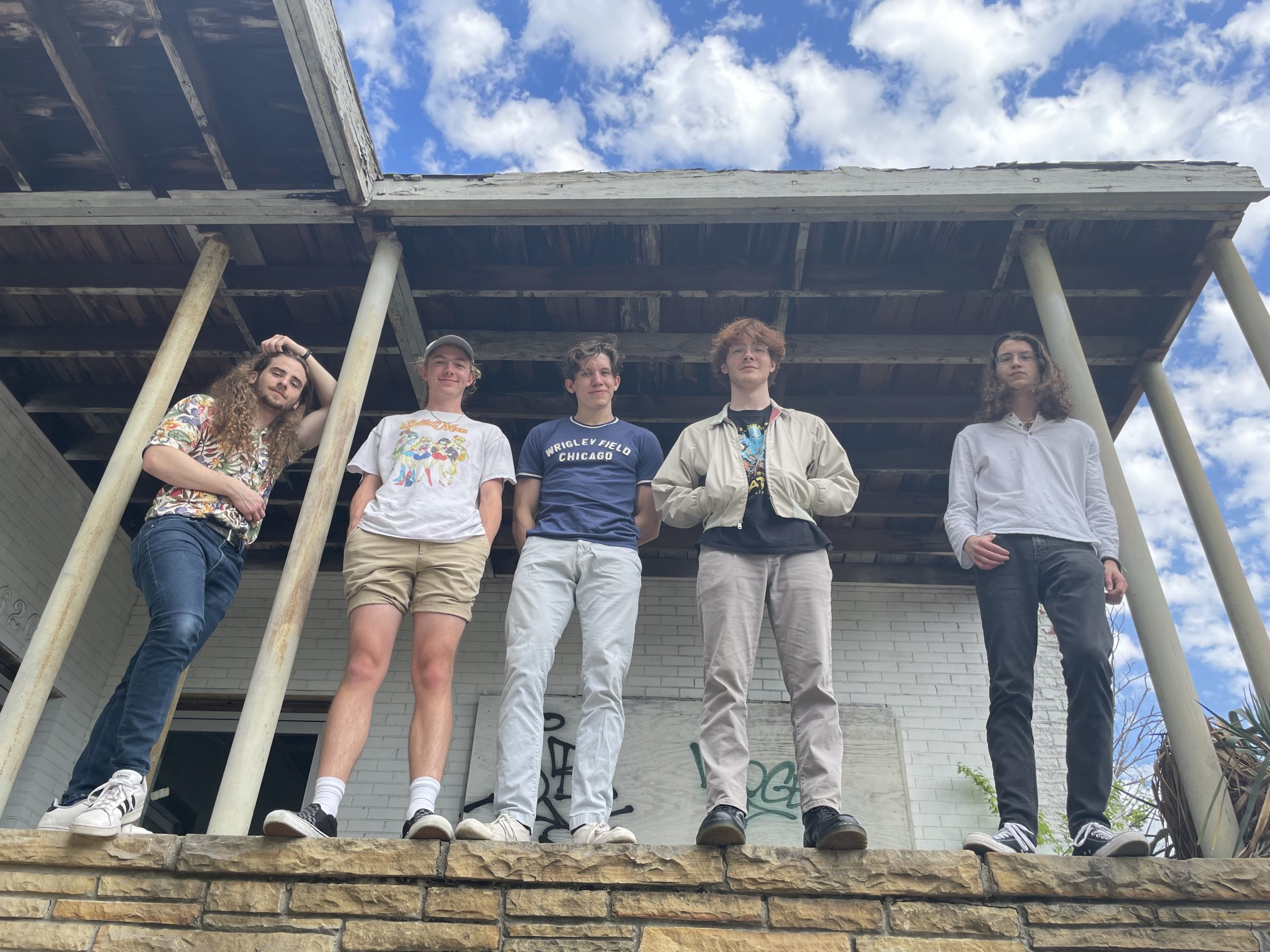Caleb Crouch came up with the name “Jombi.” He then told Bry Hart, “That’s your new nickname.”
“Five months later we decided to make that the band name,” Hart says.
And of Crouch, Hart says, “He’s a nickname guru. He loves to come up with that stuff.”
Hart, 20, is the drummer, and Crouch is bass player in the band that also includes rhythm guitarist/lead vocalist Auden Brummer, lead guitarist Sam Wallace, and keyboardist/second lead guitarist Joe Espinal.
Hart and Crouch were the initial members of Jombi. “We started as a jam band. We are now — I’m quoting a friend of ours — ‘a band of ambiguous genre.’”
The band recently released Jombi Presents… — six songs recorded at Young Avenue Sound.
A native of Jackson, Mississippi, Hart was influenced by his dad, Fred Hart, a guitarist who played in bands in high school and college. “He did a lot of the same things I’m currently doing now.”
And, Hart says, “He formed Grandmaw’s Attic when grunge came around. They all went to Delta State University and they played around Cleveland, Mississippi. They had a decent audience and they made a record. I’m saying all this ’cause I think that had a big influence on me wanting to write my own music and perform it live and network.”
His dad introduced him to a lot of music, including Mötley Crüe, Jimi Hendrix, and The Cars, when Hart was 5 years old. “He showed me all the stuff he listened to when he was younger. He also showed me bands like The Cult and Drivin N Cryin. That’s one of the first CDs I ever listened to — the Smoke album.”
Hart also was into “the toddler stuff.” He recalls dancing to The Wiggles, which was an influence on his own music direction. “The blue Wiggle, Anthony, played drums and I wanted to be like him.”
He also loved the Jet song, “Cold Hard Bitch,” which his parents just referred to as “Drums.”
“I’m sure it was the visceral nature of it, hitting things,” he remembers. “Listening to songs and learning the drum parts attracted me more than learning anything else in the song. Even as a young kid, I could sing the songs a little bit, but I was very into the rhythmic side of things.”
When he was 3 years old, Hart got “a very small kid’s drum set” for Christmas. “I broke it on the first day. I just played it so hard. I was such a hard hitter at that age. The heads busted through and my cymbal got bent. I was disappointed, but they went out and bought me another one.
“I went through about six of those Walmart hundred dollar kid’s drum sets. By the time I was about 5 [years old], my parents started to understand there was more going on.”
On his 6th birthday, Hart got a Pearl Forum drum kit. “One of their beginner series and it was beautiful. It has black, sparkly wrap. I still have it, but I don’t play it.”
Hart who began taking drum lessons when he was 7 years old, moved with his family to Southaven when he was 11. He began studying at School of Rock Memphis a year after it opened. “Being with kids who shared the same passion as I did, connecting with them, playing, lit some fire in me.
Hart expanded his musical knowledge and foundation while studying at School of Rock Memphis. “Getting so used to playing live before I even went out and did it on my own was super beneficial to me. As well as having and knowing the benefit of having chemistry on stage. Being able to communicate on stage. Being able to communicate in a practice space.”


His first band, but not one he formed, was 2nd Gen, which played “a good mix of stuff,” including a lot of ’80s material like “Don’t Stop Believin’”and “Don’t You (Forget About Me).”
Hart was in the drum line in marching band from freshman to junior year at Lewisburg High School. “Drum line opened my eyes to a lot of the techniques I think I had missed out on learning [on a] drum set and, specifically, rock songs. Using different grips and focusing more on dynamics as well as writing in general. Hearing a lot of the music that was written for marching band and symphonic band was very influential because I had never been super into that stuff before I was forced to play it.”
Hart became close friends with Crouch and Espinal at School of Rock. Sharing the same musical tastes, the three started a band, Water Illusion, with another friend, Max Dixon. “We had listened to a lot of the progressive rock that had come out of the ’70s as well as some progressive metal like Dream Theater. So, we tried to write this intricate stuff while we were very young.”
After that band broke up, the musicians took a break until the summer of their sophomore year when they formed another band, Illustrated History. “This time writing stuff a little less technical.”
They were the backing band playing original music by Livia Overton, who was the singer. But that project didn’t gel.
Then Covid hit. During quarantine, Hart, who began writing songs when he was about 12 after “messing around with GarageBand on an iPad,” went to his computer and wrote 15 songs, which he made into demos with Brummer as vocalist.
Hart, who originally was influenced by drummer Neal Peart of Rush, says, “His lyricism really attracted me.”
A lot of Hart’s lyrics were “fiction-based. I was writing little stories inside of songs.”
He recorded one of his songs, “Vanessa,” at Young Avenue Sound with Brummer as vocalist. “It sounded way better than we could ever have imagined. First recorded song of mine I had ever heard.”
He released it on Spotify and other streaming platforms under his name.
“Vanessa” was the impetus to form Jombi a month later. “I had the idea to get a band together just to perform ‘Vanessa’ live. That’s all I wanted to do. I wanted to perform ‘Vanessa’ live and maybe start writing some other songs for the band.”
He and other members of what would become Jombi got together to “see how the musical chemistry and social chemistry works.”

They listened to a lot of Phish. They liked “the complex arrangements with the live improv and a very heavy emphasis on funk and groove-oriented stuff as well as a commercial sense.”
“Vanessa” sounded great with the band, so they added some covers. “We do a Band of Gypsies song, a Cream song or two, Doors. We would take those songs and make them jam-based songs. We’d improv over them for long periods of time.
“We would take an idea we had and then everybody would add their own little fairy dust to it and make it a Jombi song.”
They had about three songs finished when they played their first show a year ago at Hi Tone. “When we stepped on stage, we let loose. And everything that makes us us kind of came out. We found our footing as a live band, a live act, just by doing that. Going out and doing it. ’Cause you can’t do that in a rehearsal. There are 70 people looking at you.”

As for the new album, Hart says, “We have written a bunch of songs that all sounded different. Most people nowadays hold onto singles and just release single after single after single. After I realized how different each of our songs sounded, I realized that wasn’t a good idea because the songs sounded so apart from each other. It wouldn’t even sound like the same band.”
So, they decided to do an album so they “could put all of those songs together. I think all of them connect in some way because we wrote them together and recorded them together.”
“Party Time,” one of the songs, lasts 10 minutes. “Lyrically, it came from Crouch’s dad. He wrote poetry when he was younger.”
The poem was about growing older. “As time goes on and time gets harder, you’re still going to have the people that stay with you and make things easier.”
“We’re all nerds,” Crouch says. “We’ve all spent an obscene amount of time practicing our instruments. That amount of study is bound to affect the music you play and write. There isn’t anything we can do about it. Our music is kind of nerdy. To me, that’s what I like about it and what sets it apart.”
And, he says, “I think we do a good job at making heady music accessible to anyone willing to listen.”
“I feel like we’re quite a young band for the music we play,” Wallace says. “I have a lot of musician friends and a lot of them are doing stuff that’s a lot more modern, in my opinion. I know guys who play punk rock, grunge music, but I really feel Jombi, in a way, captures a more classic vibe with kind of a modern twist.”
“We all have fairly different music tastes,” Brummer says. “We can all kind of appreciate each other’s. Caleb really loves jazz. Bry is into progressive music. Me and Joe are into jam bands. And Sam is more into modern indie stuff. And kind of having all those music interests and different styles in one group lends its an interesting sound.”
They bring their influences into the music they create, Brummer adds. “On our last album we had a 10 minute long fusion kind of jam song. And then we had a three-minute pop song as well. It’s a varied musical environment to be in. Having all those different skill sets and creative brains in one place allows us to do certain things with music that other bands — at least in Memphis — might not.”
“We’ve each played with each other for a number of years, so we have a unique chemistry that only comes with time,” Espinal says. “As a result, we have the ‘Jombi sound,’ which is the blend of each of our styles with the cohesiveness of knowing each other really well.”
Wallace will be moving to Nashville before the end of summer, Hart says. “Which may create a bit of a halt in our process, but I don’t fear it.
“The big picture is to record as many songs as possible and to play live out of Memphis. Get around Tennessee, the Southern region, and promote our music and play live. That’s a big goal for us.”
Hart is confident about Jombi’s future. “In a non-egotistical way, we have developed our craft playing our instruments for a long time. And we’ve done that all in the same place, in the same environment, to where the chemistry we have on stage is undeniable.”
To listen to Jombi Presents…, click here: https://songwhip.com/jombi-presents
